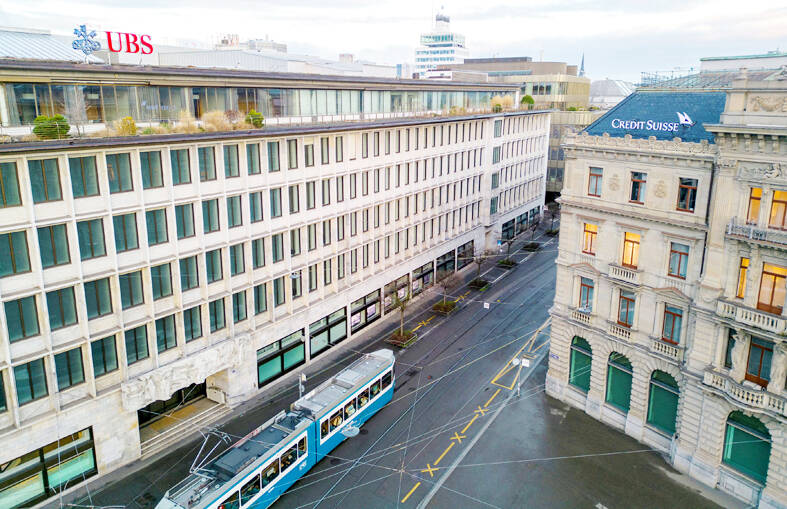The merger between Credit Suisse Group AG and UBS Group AG could result in up to 36,000 jobs being cut across the world, the SonntagsZeitung weekly reported yesterday.
The takeover by UBS of Credit Suisse in a US$3.23 billion deal was hastily arranged by the Swiss government on March 19 to prevent a global financial meltdown, following fears of contagion from the collapse of banks in the US.
UBS on Wednesday announced it would bring back former CEO Sergio Ermotti to handle the huge risks involved in the Swiss banking giant’s controversial absorption of its troubled rival Credit Suisse.

Photo: Reuters
The SonntagsZeitung report said management was mulling cutting 20 to 30 percent of the workforce, meaning between 25,000 and 36,000 jobs.
Up to 11,000 jobs could be cut in Switzerland alone, it said, citing internal anonymous sources.
Before the merger, UBS and Credit Suisse had employed slightly more than 72,000 and 50,000 people respectively.
UBS and Credit Suisse, the second-biggest bank in Switzerland, were among the select banks around the world considered to be “global systemically important financial institutions” and therefore deemed too big to fail.
UBS chairman Colm Kelleher said last week: “There’s a huge amount of risk in integrating these businesses.”
Meanwhile, Norges Bank Investment Management is to vote against the re-election of Credit Suisse chairman Axel Lehmann and six other directors at the Swiss lender’s annual general meeting on Tuesday, the Norwegian wealth fund said on its Web site.
“Shareholders should have the right to seek changes to the board when it does not act in their best interest,” it said.
In addition to Lehmann, Norges is also opposing re-election of Credit Suisse directors Iris Bohnet, Christian Gellerstad, Shan Li (李山), Seraina Macia, Richard Meddings and Ana Pessoa.
Credit Suisse declined to comment, and UBS did not immediately respond to a request for comment.
Additional reporting by Reuters

Quanta Computer Inc (廣達) chairman Barry Lam (林百里) is expected to share his views about the artificial intelligence (AI) industry’s prospects during his speech at the company’s 37th anniversary ceremony, as AI servers have become a new growth engine for the equipment manufacturing service provider. Lam’s speech is much anticipated, as Quanta has risen as one of the world’s major AI server suppliers. The company reported a 30 percent year-on-year growth in consolidated revenue to NT$1.41 trillion (US$43.35 billion) last year, thanks to fast-growing demand for servers, especially those with AI capabilities. The company told investors in November last year that

Intel Corp has named Tasha Chuang (莊蓓瑜) to lead Intel Taiwan in a bid to reinforce relations between the company and its Taiwanese partners. The appointment of Chuang as general manager for Intel Taiwan takes effect on Thursday, the firm said in a statement yesterday. Chuang is to lead her team in Taiwan to pursue product development and sales growth in an effort to reinforce the company’s ties with its partners and clients, Intel said. Chuang was previously in charge of managing Intel’s ties with leading Taiwanese PC brand Asustek Computer Inc (華碩), which included helping Asustek strengthen its global businesses, the company

Taiwanese suppliers to Taiwan Semiconductor Manufacturing Co. (TSMC, 台積電) are expected to follow the contract chipmaker’s step to invest in the US, but their relocation may be seven to eight years away, Minister of Economic Affairs J.W. Kuo (郭智輝) said yesterday. When asked by opposition Chinese Nationalist Party (KMT) Legislator Niu Hsu-ting (牛煦庭) in the legislature about growing concerns that TSMC’s huge investments in the US will prompt its suppliers to follow suit, Kuo said based on the chipmaker’s current limited production volume, it is unlikely to lead its supply chain to go there for now. “Unless TSMC completes its planned six

TikTok abounds with viral videos accusing prestigious brands of secretly manufacturing luxury goods in China so they can be sold at cut prices. However, while these “revelations” are spurious, behind them lurks a well-oiled machine for selling counterfeit goods that is making the most of the confusion surrounding trade tariffs. Chinese content creators who portray themselves as workers or subcontractors in the luxury goods business claim that Beijing has lifted confidentiality clauses on local subcontractors as a way to respond to the huge hike in customs duties imposed on China by US President Donald Trump. They say this Chinese decision, of which Agence